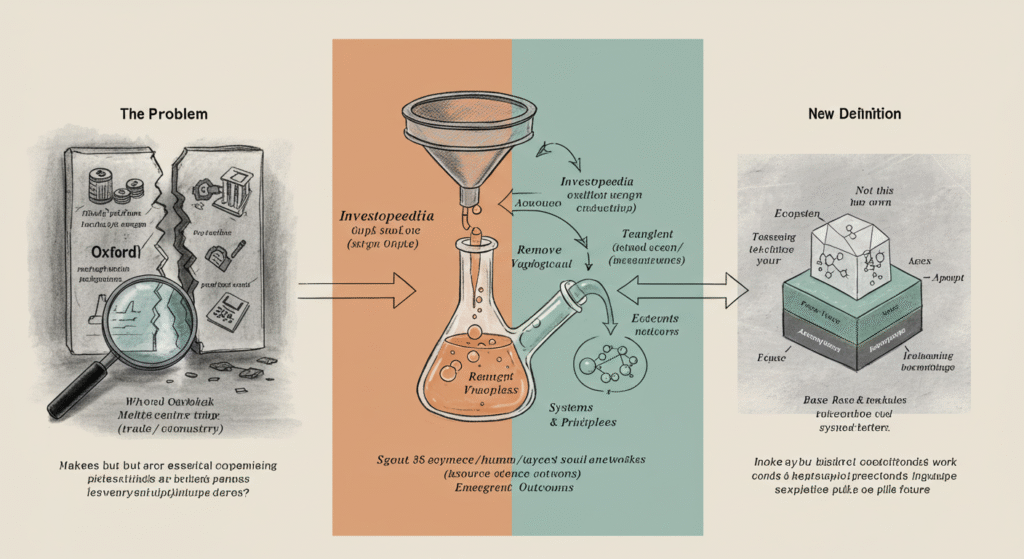After five years of immersing myself in the world of economics, I found myself at a crossroads: I couldn’t quite put into words what economics truly means to me.
My stumbling answer—“the study of resources… in societies… trading, banks, and stuff”—was a moment of realization. It was a moment that made me question the very foundation of my understanding of economics. Had I spent years mastering graphs and equations without truly understanding the essence of the discipline?
This sparked a quest within me for a definition that not only encapsulates the breadth of economics but also delves into its intricacies, avoiding the pitfalls of being too general or too specific.
The Problem with Common Definitions
I started with dictionary definitions, but none felt precise enough:
1. Oxford Languages:
“The branch of knowledge concerned with the production, consumption, and transfer of wealth.”
❌ Too broad—Does this include how banks process transactions? This definition, while encompassing the significant aspects of economics, fails to capture the intricacies and the evolving nature of the discipline.
2. Cambridge English Dictionary:
“Relating to trade, industry, or money.”
❌ Even broader—Does printing currency count as economics?
3. Investopedia:
“A social science focused on the production, distribution, and consumption of goods and services, analyzing choices under resource constraints.”
❌ Still fuzzy—Where does economics stop? Is Toyota’s assembly line part of it?
None of these captured the core of economics, so I set out to craft my own.

Building a Better Definition
Step 1: Economics Studies Economics
Most definitions conflate economics (the study) with economies (the subject). I separated them:
Economics is the study of economies
But what is an economy?
Step 2: Defining an Economy
Dictionary definitions often limit economies to specific geographic regions (such as countries or cities) or monetary systems. But economies exist beyond these:
- Prison economies (trading favors, contraband)
- Household economies (time, income, chores)
- Digital economies (cryptocurrencies, virtual goods)
- Even ant colonies (food, labor allocation)
So I landed on:
Economy: A network of intelligent agents (people, AIs, even animals) managing scarce resources, shaped by incentives and constraints.
Covers:
✅ Who’s involved? (Decision-makers)
✅ What’s managed? (Resources—money, time, goods)
✅ What shapes it? (Incentives + scarcity)
Step 3: Refining the Definition of Economics
Economics doesn’t just describe economies—it seeks patterns, principles, and predictions. These could be the cyclical nature of economic booms and busts, the principles of supply and demand, or predictions about the impact of policy changes on an economy. So I expanded:
Economics is the study of past, present, or potential economies, aiming to discover or explain general patterns.
This excludes:
❌ Impossible systems (e.g., a “sneeze-based economy”)
❌ Pure engineering (e.g., Toyota’s assembly line logistics)
But includes:
✅ Historical economies (Medieval trade routes)
✅ Theoretical economics (Marx’s communism, game theory models)
✅ Emergent economies (Crypto, AI marketplaces)
Why This Definition Works
- Flexible yet precise—Applies to any resource-managing system.
- Focuses on why—Economics seeks patterns, not just descriptions.
- Separates study (economics) from subject (economics)—No more vagueness.
Final Thought: The Power of Clear Definitions
Economics isn’t just about graphs or GDP—it’s a lens for understanding how societies, groups, and even algorithms allocate scarce resources. Just as a lens allows you to focus on specific details, economics enables us to examine how resources are managed in various systems.
Now, when someone asks, “What’s economics?”, I’ll say:
“It’s the study of how intelligent systems—from nations to ant colonies—manage limited resources, and the patterns that emerge.”
At least I didn’t waste those five years after all.
What do you think? Does this definition hold up? Where does it break? Let’s discuss.
Share this content:



